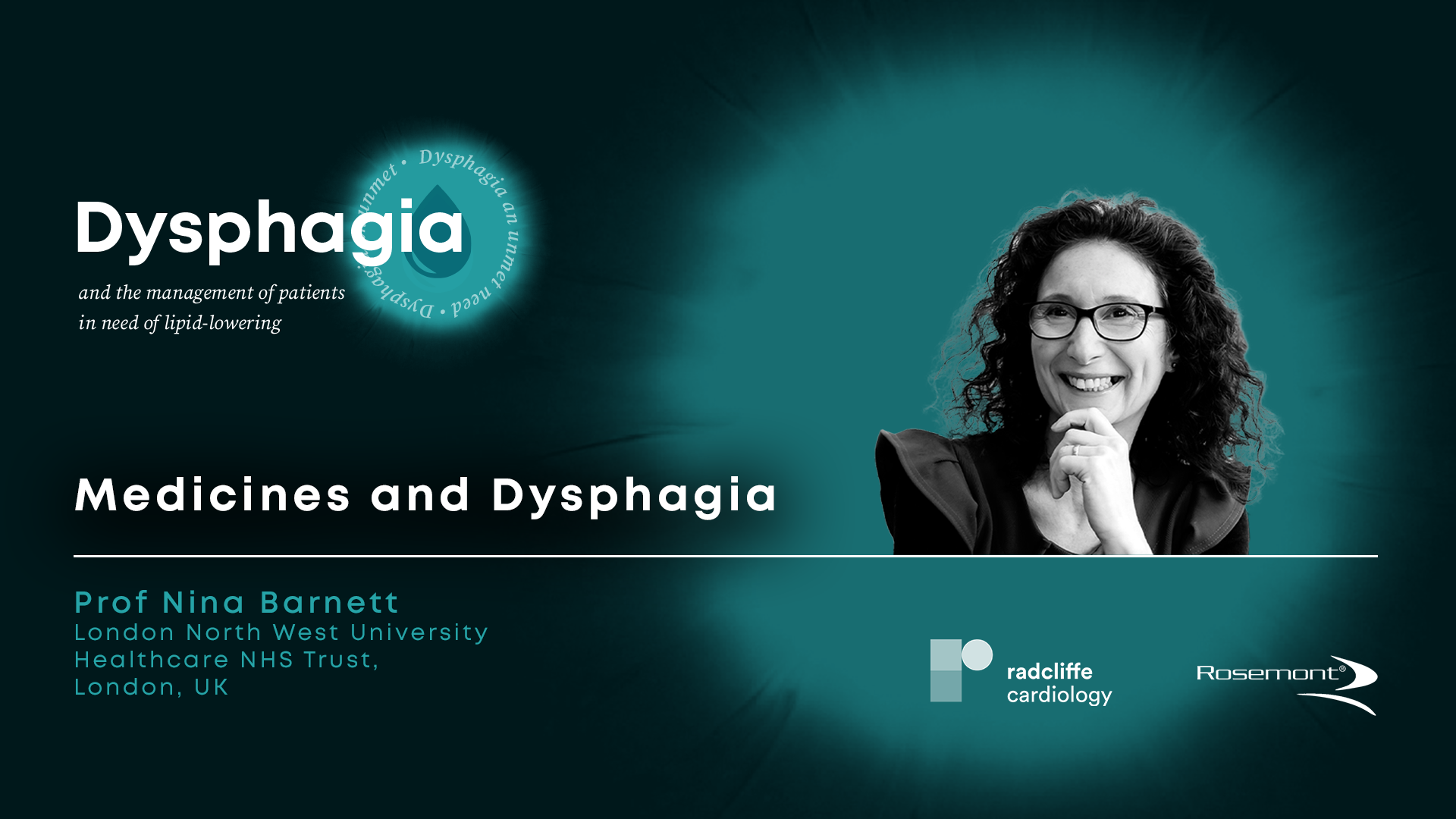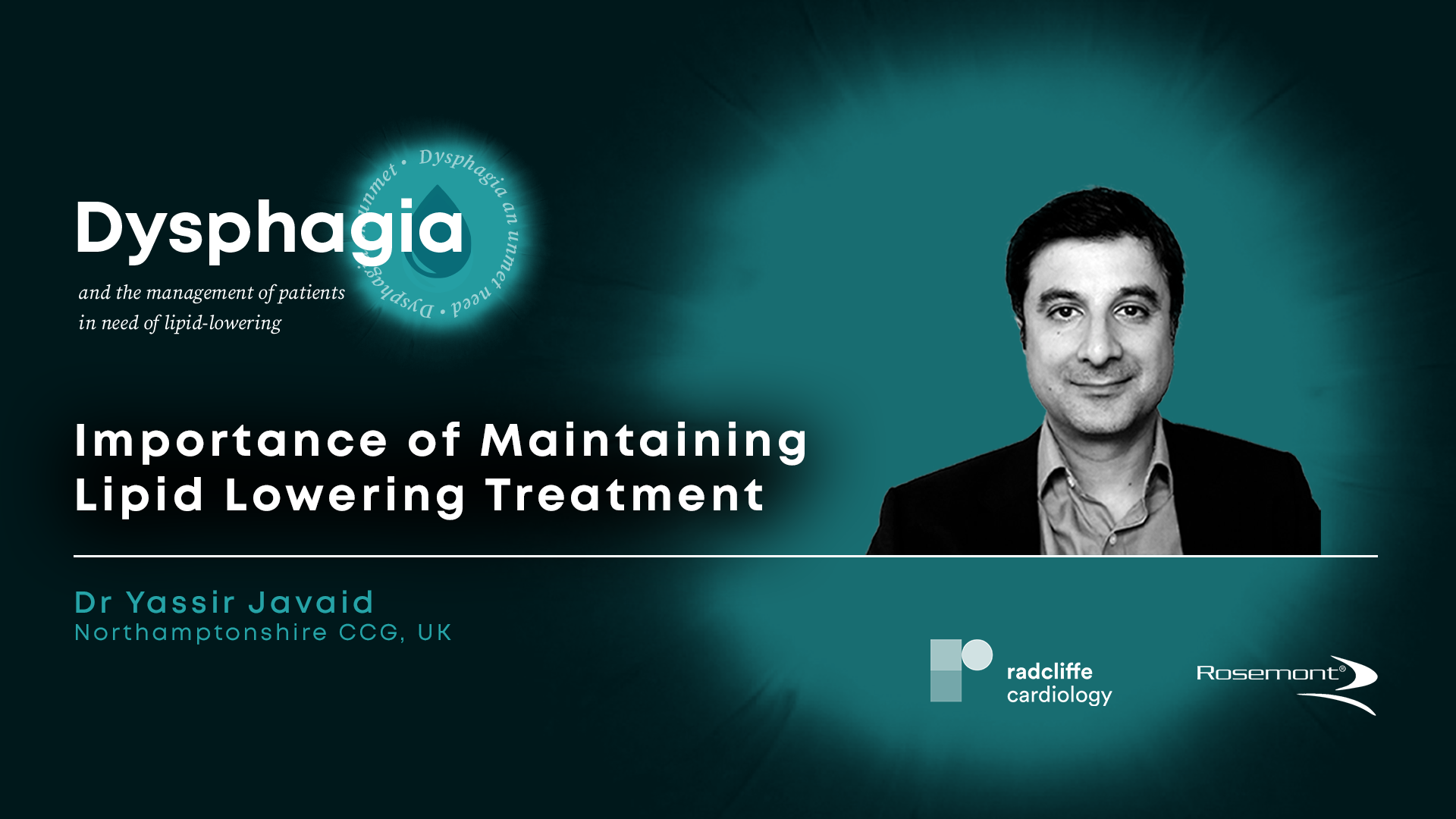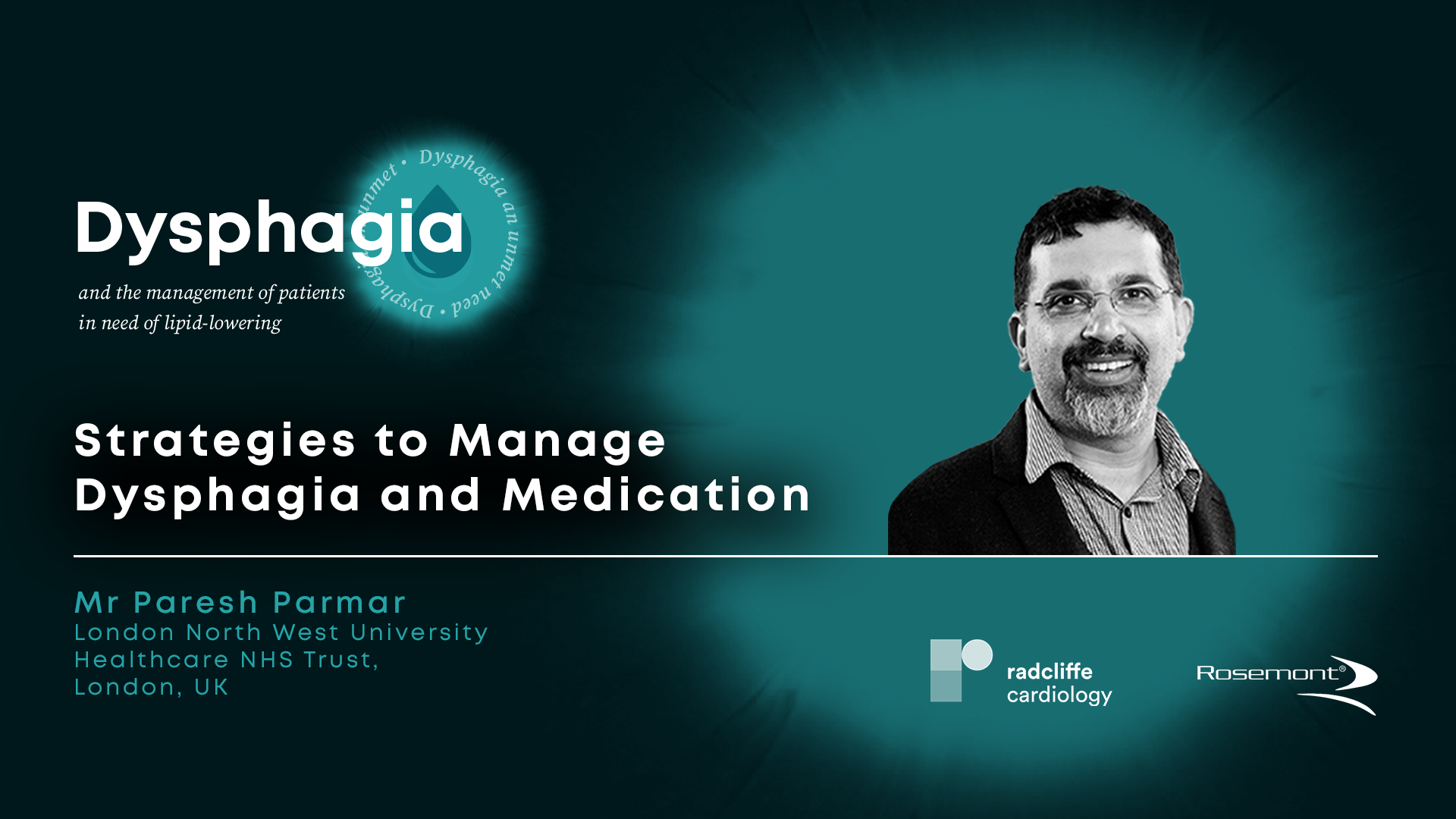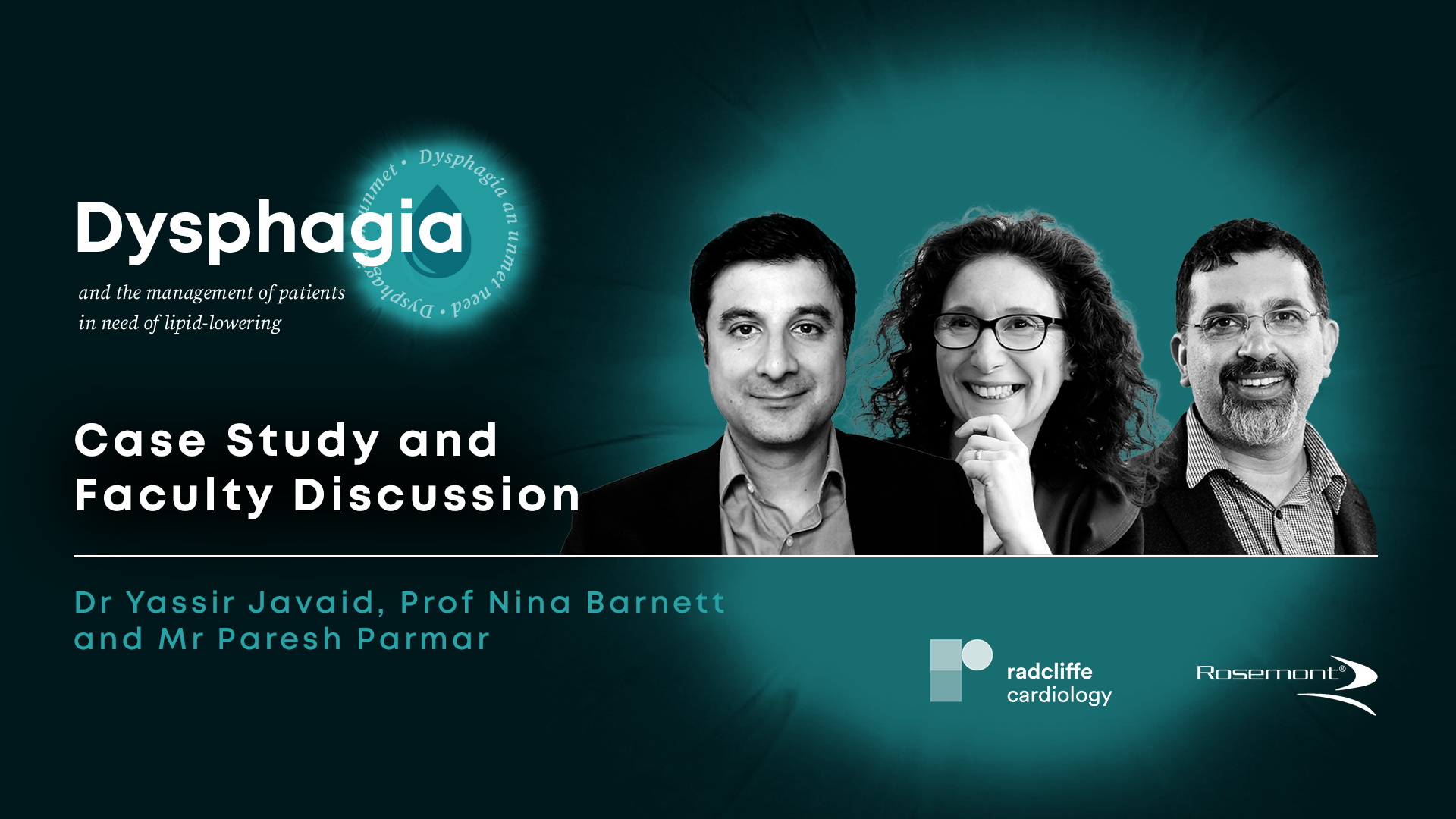Dysphagia and the Management of Patients in Need of Lipid-Lowering
Published: 20 July 2022
-
Views:
 6786
6786
-
Likes:
 7
7
-
Views:
 6786
6786
-
Likes:
 7
7
-
 18m 47sPart 1 Medicines and Dysphagia Yassir Javaid, Nina Barnett, Paresh Parmar
18m 47sPart 1 Medicines and Dysphagia Yassir Javaid, Nina Barnett, Paresh Parmar
-
 11m 33sPart 2 Importance of Maintaining Lipid Lowering Treatment Yassir Javaid
11m 33sPart 2 Importance of Maintaining Lipid Lowering Treatment Yassir Javaid
-
 13m 17sPart 3 Strategies to Manage Dysphagia and Medication Paresh Parmar
13m 17sPart 3 Strategies to Manage Dysphagia and Medication Paresh Parmar
Overview
This virtual round table series focuses on dysphagia and the management of patients in need of lipid-lowering medications. The first three sessions of this video series are presented by Dr Yassir Javaid (Northamptonshire CCG, UK), Prof Nina Barnett (London North West University Healthcare NHS Trust, UK) and Mr Paresh Parmar (London North West Healthcare NHS Trust, UK) followed by session four, a faculty discussion on patient case study.
Dysphagia is a life-threatening disorder that can be caused by a number of conditions, such as stroke, neurological disorders and tumours. By participating in this series, you will gain further insight into the diagnosis of dysphagia, medication adherence, the importance of lipid management and individualising your treatment approach. The renowned faculty will also present and discuss a real-life clinical study.
Dysphagia and the Management of Patients in Need of Lipid-Lowering
In this section, we explore the effectiveness of statin medications, its administration, and its potential to improve patient compliance. We underscore the crucial role of liquid medicine in meeting specific patient requirements and assess its impact on statin therapy delivery.
NEW - Empowering Dysphagia Patients on the Path to Heart Health
Managing Dysphagia
Dysphagia, or difficulty swallowing, is a common and often debilitating condition that affects individuals of all ages. It can result from various causes, including neurological disorders, structural anatomical abnormalities, or muscular dysfunction. Dysphagia can have significant consequences on a person's quality of life, nutritional status and overall health. Therefore, it is crucial to increase awareness and understanding of this condition to ensure timely diagnosis, appropriate management and improved patient outcomes. When addressing the specific swallowing needs of individual patients, opting for liquid medications can be a valuable strategy to mitigate potential risks. However, it is crucial to engage with clinicians who have expertise in dysphagia in order to ensure a comprehensive approach that aligns with the individual’s requirements.
Dysphagia is prevalent, affecting a significant proportion of individuals. Among patients who have suffered a stroke, up to two-thirds experience dysphagia1, highlighting its high incidence in this population. Additionally, up to approximately 60% of individuals with dementia also face the challenge of dysphagia1. It has been reported that between 10 and 40% of all adult’s experience difficulty swallowing solid tablets2. In addition, dysphagia has a high prevalence among the elderly3. Management strategies for dysphagia may include dietary modifications, swallowing exercises and the use of assistive devices4. In some cases, liquid medications or alternate formulations are prescribed to address swallowing difficulties and ensure medication adherence.
Enhancing Outcomes with Liquid Statin Medications
Achieving optimal cardiovascular outcomes with statin treatments relies on adherence to the prescribed regimen5. Unfortunately, adherence to statin therapy is frequently sub-optimal, resulting in inadequate reduction of LDL-C levels5. Non-adherence to treatment can stem from various factors, often specific to each patient's circumstances and personal considerations6. Statin non-adherence therefore poses a significant clinical burden6. For individuals who have difficulty swallowing solid tablets, their treatment adherence and therapeutic outcomes may be compromised7. This can lead people with dysphagia to resort to crushing tablets, which carries the risk of adverse drug reactions7. It is important to note that the Royal Pharmaceutical Society advises that if the formulation of a medicine is manipulated, then the product will then be classed as unlicensed8. However, the use of liquid medicines offers a solution to mitigate these risks. Liquid formulations may provide a more suitable and easier-to-swallow option for individuals with dysphagia, ensuring that they can take their medication without the challenges associated with solid tablets9. By addressing the issue of non-adherence through the availability of liquid medications, the clinical burden of statin non-adherence can be reduced, leading to improved outcomes and a decreased risk of stroke, major cardiac events and mortality10.
Addressing statin non-adherence through liquid medications may help enhance cardiovascular outcomes especially in the case of vulnerable patients.
By raising awareness, promoting the use of liquid medications and addressing non-adherence, healthcare professionals can significantly improve patient care and outcomes for individuals affected by dysphagia and who require statin therapy.This educational presentation is funded by Rosemont Pharmaceuticals.
ROS000011-005 August/2023
Find out more about Rosemont’s Atorvastatin 4mg/ml Oral Suspension
Further information or education for your patients on dysphagia from RosemontProvide your patients with a better understanding of dysphagia
Report any adverse events
To access additional patient management resources, download the helpful infographic here
References
1. Royal College of Speech and Language Therapy (2018) Guidance on the management of dysphagia in care homes.
2. Forough et al. 2018, A spoonful of sugar helps the medicine go down? A review of strategies for making pills easier to swallow, Patient Prefer Adherence 2018 Jul 26;12:1337-1346.
3. Clavé P, Shaker R. Dysphagia: current reality and scope of the problem. Nature Reviews Gastroenterology & Hepatology. 2015 May;12(5):259
4. National Health Service. Swallowing problems (dysphagia). NHS. Retrieved July 11, 2023, from https://www.nhs.uk/conditions/swallowing-problems-dysphagia/
5. García-Fernández-Bravo et al. 2022. Undertreatment or Overtreatment With Statins: Where Are We? Front Cardiovasc Med. 2022; 9: 808712.
6. Wouters et al. Understanding Statin Non-Adherence: Knowing Which Perceptions and Experiences Matter to Different Patients, PLoS One. 2016; 11(1): e0146272.
7. Strachan & Greener 2005, Medication-related swallowing difficulties may be more common than we realise, Pharmacy in Practice, 2005/11/01.
8. RPS Pharmaceutical Issues when crushing, opening or splitting oral dosage forms. June 2011.
9. Greenwall R. Medicine Management. Medicines management and older people – a guide for healthcare professionals. Aug 2017.
10. Lansberg et al. 2018, Nonadherence to statins: individualized intervention strategies outside the pill box, Vasc Health Risk Manag. 2018; 14: 91–102.
Top chemical substances dispensed in England by items 2022 | Statista: https://www.statista.com/statistics/378445
Help us understand the impact of this activity by participating in this brief survey
This educational presentation is funded by Rosemont Pharmaceuticals.

ROS000011-005 August/2023

Key Learning Objectives
- Identify patient subgroups who need encouragement with medicine adherence
- Discuss the importance of maintaining statin treatment in patients at cardiovascular risk
- Recall emerging strategies for dysphagia
- Implement an individualised management approach for patients
Target Audience
- General practitioners
- Pharmacists
- Nurses
- HCPs
More from this programme
Part 1
Medicines and Dysphagia
| 1 session | |
| Medicines and Dysphagia | Watch now |
Part 2
Importance of Maintaining Lipid Lowering Treatment
Part 3
Strategies to Manage Dysphagia and Medication
Part 4
Case Study and Faculty Discussion
| 1 session | |
| Case Study and Faculty Discussion | Watch now |
About the episode
This all-faculty discussion will present a clinical case study that will provide practical tips and further discuss challenges, and how to overcome them, in a clinical scenario.
Faculty Biographies

Yassir Javaid
GPwSI Cardiology
Dr Yassir Javaid, Cardiovascular & Diabetes Lead Northamptonshire CCG, UK. Qualified from Cambridge University and completed his GP VTS training in Northampton. He has an interest in cardiology and echocardiography and was a clinical lead in the Northamptonshire Community Cardiology service, which had a focus on patients with heart failure and valve disease. Dr Javaid was named Pulse “GP of the Year” in 2015 for his work in reducing stroke emergency admissions in the East Midlands. He is also a council member of the British Heart Valve Society, accredited member of the British Society of Echocardiography and on the editorial board for the British Journal of Cardiology.

Nina Barnett
Consultant Pharmacist, Care of Older People
Prof Nina Barnett is a Consultant Pharmacist in care of older people at London North West hospital and Visiting Professor at Kingston University London, UK, with over 25 years’ experience. She delivers outstanding medicines-related coaching, mentoring and education using a person-centred approach. Her areas of expertise as a consultant pharmacist in care of older people include polypharmacy, deprescribing, multi-morbidity and shared decision making. Prof Nina Barnett is an invited speaker and frequently published in leading journals. She contributes at a strategic national level for example, with National Institute for Health and Care Excellence (NICE) and with leading clinicians in the UK.

Paresh Parmar
Clinical Lead Pharmacist, Care of Older People & Stroke
Paresh Parmar is an experienced Lead Clinical Pharmacist at London North West Healthcare NHS Trust, UK, with a demonstrated history of working in the hospital and healthcare industry. Skilled in Healthcare, Clinical Research, Medicine, and Clinical Trials. Paresh Parmar is a strong research professional with a Non-Medical Independent Prescribing focused on Secondary Prevention of Stroke from Kings College London. As lead pharmacist for stroke, he is actively involved in ward pharmacy services and advising prescribers on the appropriate medication for patients with dysphagia, complex co-morbidities and reduced renal and hepatic function.






